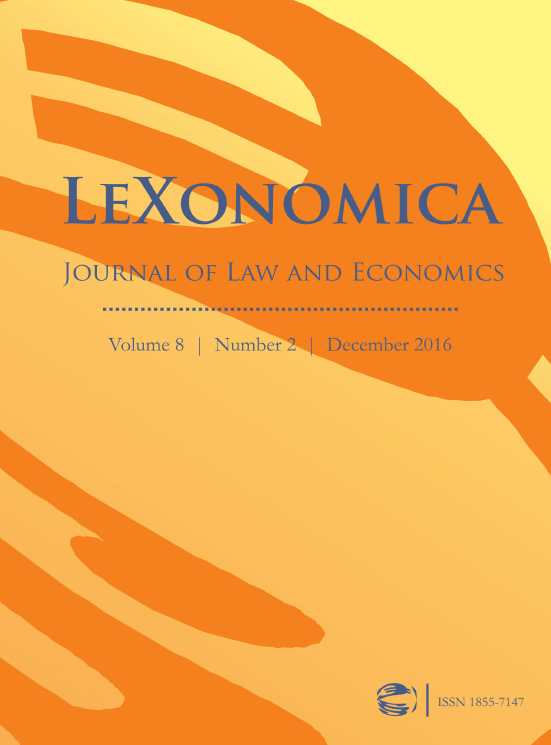Flexicurity or Flexicarity? - A Portuguese Overview
Keywords:
labour • flexicurity • security • flexibility • employmentAbstract
Due to the increasing competition on the labour market, the search for new approaches to labour legislations led to the creation and adoption, in some countries, of so called “flexicurity”. “Flexicurity” became top of the list in the policy agenda in the European Union, but there is doubt that such an agenda for encompassing labour market reform providing not employment. As sources are used “flexicurity” models, in countries where it has already been successfully implemented, as well as Eurostat data, information made available by the European Commission, as well as doctrinal and research papers. Portuguese jurisdiction is considered by national legal doctrine as a closed model. Heavy regulation and constitutional constraints drive an almost unanimous rejection of the possibility to introduce the concept at national level. This article's goal is to discuss the ways the concept could be introduced in the Portuguese jurisdiction. Would the model effectively create security, or would it result in precarity?Downloads
References
Agell, J. (1999) On the benefits from rigid labor markets: norms, market failures, and social insurance, Economic Journal, 109 (453), pp. 143–164.
Auer, P. (2006) Protected Mobility for Employment and Decent Work: Labour Market Security in a Globalized World, Journal of Industrial Relations, 48(1), pp. 21–40.
Auer, P., Efendioglu, U. & Leschke, J. (2004) Active Labour Market Policies around the World: Coping with the consequences of Globalisation (Geneva: Employment Strategy).
Atkinson, J. (1984) Flexibility, Uncertainty and Manpower Management, IMS Report
No. 89 (Brighton: Institute of Manpower Studies). Retrieved from http://www.employment-studies.co.uk/system/files/resources/files/89.pdf
Constituição da República Portuguesa. Retrieved from http://www.portugal.gov.pt/en/portuguese-democracy/a-constituicao-da-republica/a-constituicao-da-republica.aspx
Costa, H. A. (2009) A flexisegurança em Portugal desafios e dilemas da sua aplicação. Revista Crítica de Ciências Sociais, 86, pp. 123–144.
Employment in Europe 2006. EC (European Commission) - Office for Official Publication of the European Communities: Luxembourg. Retrieved from http://europa.eu/legislation_summaries/employment_and_social_policy/situation_in_europe/c11336_en.htm
Emerek, R (2008) Highly developed flexicurity – less developed gender mainstreaming. A report from the Danish labour market (Luxembourg: European Commission).
Hansen, L. L. (2007a): From Flexicurity to Flexicarity? Gendered Perspectives on the Danish model, Journal of Social Sciences, 3(2), pp. 88–93.
Heyes, J. Hastings, T. (2016.) Where now for flexicurity? Retrieved online at: http://speri.dept.shef.ac.uk/wp-content/uploads/2016/03/Global-Brief-3-Where-now-for-flexicurity.pdf
Jensen, C. (2008) Employment relations in Denmark: Explaining flexicurity. Annual meeting of the American Sociological Association Annual Meeting. Boston. Retrieved from http://citation.allacademic.com/meta/p240930_index.html
New EU report shows active labour policy can increase employment rate despite low growth, EC (European Commission). Retrieved from
http://ec.europa.eu/employment_social/emplweb/news/news_en.cfm?id=81.
Pareceres da UGT. (2007). Retrieved from http://www.ugt.pt/parecer_28_03_2007.pdf
Santos, R. S. (2007) O papel dos parceiros sociais na flexisegurança. Cadernos de Emprego e Relações de Trabalho, pp. 145–185.
Security in labour markets: Combining flexibility with security for decent work. (2007) Economic and Labour Market Papers, Employment Analysis and Research Unit, Economic and Labour Market Analysis Department. Geneva.
Towards Common Principles of ‘flexicurity’: More and better jobs through flexibility and security (2007) EC (European Commission) - Communication from the Commission to the Council, the European Parliament, the European Economic and Social Committee and the Committee of the Regions. Retrieved from http://ec.europa.eu/employment_social/news/2007/jun/’flexicurity’_en.pdf
Trabalho e relações laborais.
Retrieved from http://www.cies.iscte.pt/destaques/documents/ForumCIES2009_4.pdf
Wilthagen, T., Tros, F. H. (s/d). The Concept of Flexicurity: A New Approach to Regulating Employment and Labour Markets. Retrieved from http://ssrn.com/abstract=1133932
Working Together for Growth and Jobs - Integrated Guidelines for Growth and Jobs (2005–2008). EC (European Commission) - Office for Official Publication of the European Communities: Luxembourg. Retrieved from http://europa.eu/legislation_summaries/employment_and_social_policy/eu2020/growth_and_jobs/c11325_en.htm
EC - Second hearing on labour market transitions - revisiting flexicurity ( 2016). Retrieved from http://ec.europa.eu/social/main.jsp?langId=pt&catId=88&eventsId=1135&furtherEvents=yes
Downloads
Published
Issue
Section
License
© Univerza v Mariboru, Pravna fakulteta, Univerzitetna založba
Prosti pristop
